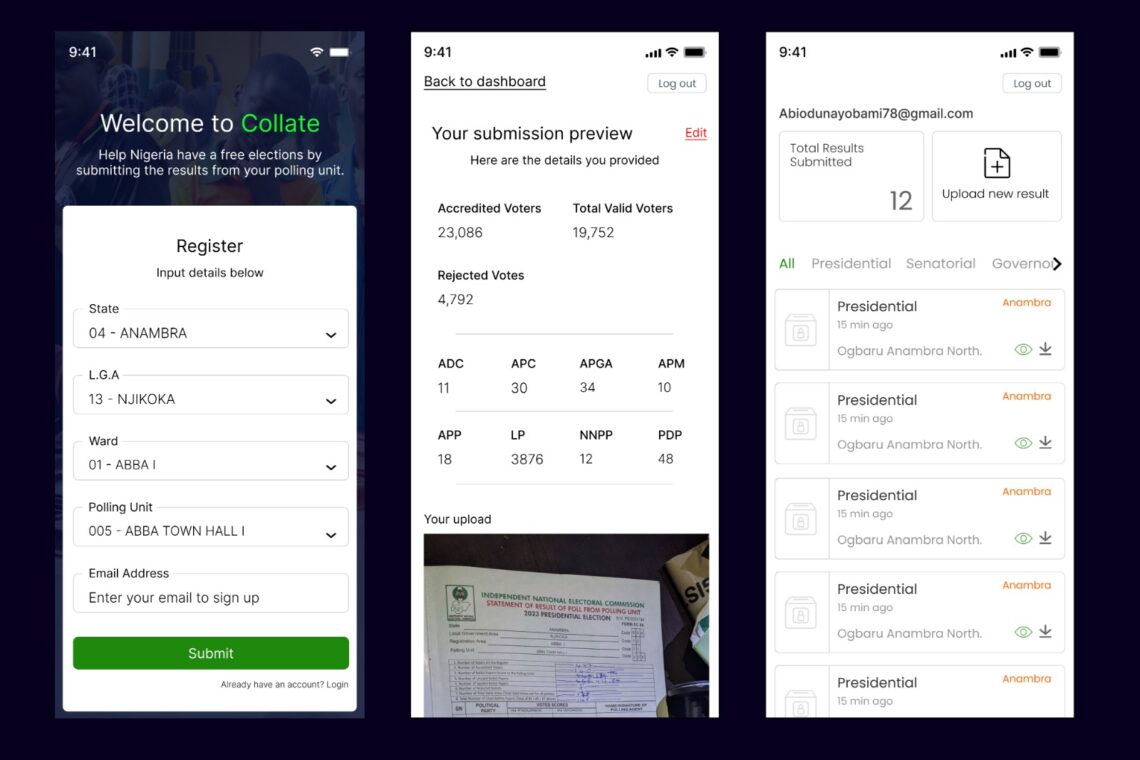Nigeria’s electoral commission’s (INEC’s) election result viewer (IREV) failed to bring transparency to the elections as it was designed to. INEC was expected to upload the results of each polling station to the IReV in real-time to increase voters’ perception of the credibility of the results. However, the highly anticipated presidential results remained uploaded hours after the election. When they finally were, thousands of the results were either carelessly tampered with or illegible. Founder of tech community TechCircle, Oo Nwoye, has built a web-app, Collate, for Nigerians to upload results from their polling units as soon as the voting is concluded.
Collate is designed to crowdsource Nigerian election results so that everyone can have real-time access to the original election results at all the polling units in Nigeria.
With the governorship elections just a day away, I decided to check it out and see how it works. It’s a web application available at https://www.collate.africa/ To use it, I first had to register by providing my state, local government area, polling unit, and email address.
After clicking the register button, I received a confirmation email from the Collate team reminding me to upload clear and accurate results. They explained that the data I input would help them collate and analyze the election results.
Well, what happens if I make a mistake that I am not aware of or if a mischievous person intentionally puts incorrect details on the website? I asked Nwoye and he said “ Everyone will be able to see the upload made by anyone at any polling unit. They can always point out which results are correct or incorrect, just like they were able to during the presidential election.”
A quick scan of Collate shows that I could upload both images and numerical data regarding the results of my polling unit. The platform provides fields to input the number of registered voters, number of verified voters, number of votes received by each political party, number of invalid votes, and the total number of votes cast.
Nwoye also added that the overarching goal is to improve transparency. “Our objective is transparency, not to provide official results. Aggregation is not our job; that is INEC’s. Besides, the Electoral Act does not give us the right to announce scores,” he explained.
I didn’t have any election results on hand, so I used dummy information to try and figure out how to upload results on the website. It was pretty easy. I clicked Upload Results” and was led to a page with my polling unit details. I chose the election type from a list showing “President, Governor, Senate, Federal House of Representatives, Governor, and State House of Assembly.” I chose governor and went on to fill out other fields asking for the total number of accredited voters, total valid votes, and rejected votes.
There is also a “Partial Votes” subsection that allows you to input the total number of votes that each political party got at your polling unit.
I clicked “Select Party,” and it showed a list of 18 political parties. After picking one party and adding their votes, you can do the same for more parties by clicking “Add another political party.”
The next thing to do was upload an image of the results. This is supposed to be an image of the results handwritten by the presiding officer at your polling unit.
After uploading it, I clicked “Preview.” The preview offers you a chance to make sure that the results you uploaded are accurate. If they are not, there is an edit button you can click to correct any mistake that you made.
If you are confident that everything is accurate, simply click on the “Submit” button. However, I chose not to click “Submit” as the data used in this tutorial is not actual election results, and I did not want to cause any issues for the Collate team.
Speaking about how there will be multiple result submissions from each unit, Nwoye highlighted that Collate can work differently for civil societies and campaigns that are using the enterprise version of the app. “Four civil societies and several campaigns are already currently using a customised version of Collate where instead of crowdsourced results, they can view results uploaded by their network of agents who are stationed at each polling unit,” he said.
I asked Nwoye about the measures he and his team are implementing to defend against malicious actors. He assured me that they have taken the necessary precautions to safeguard the site but declined to disclose the specifics. I extend my best wishes to everyone involved, except for the bad actors, of course.




















